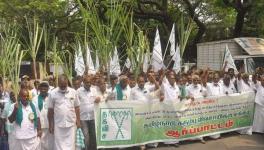Kerala to Follow Collective Farming Instead of Corporate Farming, Says State Agriculture Minister
Image for representational use only.Image Courtesy : Deccan Chronicle
Pointing towards Contract Farming, Union Agriculture Minister Narendra Singh Tomar, in conference of State Agriculture Ministers in Delhi, has said that farming can become profitable if small and marginal farmers are given access to technological solutions and research. However, the Agriculture Minister of Kerala, VS Sunil Kumar opposed government’s plan to accelerate Contract Farming in the name of advanced technologies and more productivity in the agrarian sector.
Tomar also urged the states to take effective measures to increase crop remuneration, especially by helping the farmers in reducing the input cost, increasing production and promoting exports.
However, after the State Agriculture Ministers Conference, Sunil Kumar in a press meeting on Tuesday, 9th July, made it clear that the Kerala government won’t follow the Contract Farming model which gives direct access to the corporates into the agricultural sector. Instead of that, the state would promote collective farming which is done by various co-operatives and community networks like Kudumbashree.
Read More: Contract Farming: Whose Interest Does it Serve?
“The Left Democratic Front (LDF) government in Kerala has strong political dissent over the Centre’s contract farming policy that helps corporates. Clearly, the contract farming aims for corporate feudalism,” he said.
The BJP-led Centre had unveiled the Model Contract Farming Act last year which is titled as “Model Agriculture Produce and Livestock Contract Farming and Services (Promotion and Facilitation) Act, 2018”. As per the act, corporates would get access to all the services in the agriculture value chain including pre-production, production and post-production.
While, the farmers organisations since a long time have been opposing contract farming saying that the act is aimed at helping agribusiness to make profits. Ashok Dhawale of All India Kisan Sabha had said, “the farmers who incur losses in farming, will be forced to hand over their land to the corporates for farming,” when pointing out how it would affect the farmers. Also, as per a certain provisions in this act, corporates can buy produce at lower prices than the contracted prices citing poor quality.
The Kerala government, however, promotes an alternative model to this contract farming by promoting agricultural cooperative societies and community networks like Kudumbashree which are involved in collective farming. Collective farming is based on social ownership of means of production and collective labour.
Read More: Zero Budget Farming Is as Mad an Idea as Demonetisation: Raju Shetti
If we come to Kudumbashree, it is a poverty eradication and women empowerment programme implemented by the State Poverty Eradication Mission (SPEM) of the Kerala Government in 1997. Since 2004, Kudumbashree had entered into the field of agriculture within the framework of Community Based Organization. The community Development Societies (CDS) and Area Development Societies (ADS) mobilize women farmers for lease land farming from Neighbourhood Groups (NHGs) which is a grassroot level organization.
Most of these women farmers are landless or have only marginal lands and take fallow land on lease. Kudumbashree was always keen to facilitate their sustained existence and thus, they came up with the scheme which would provide incentives in the farming sector with the assistance from the State Government. Area incentive was given to landless farmers who had taken land on lease, where as, production incentive was given to both- who were cultivating on own land as well as on leased lands. The incentives are disbursed only after the harvest, which is 10 percent of the production cost.
“Assistance were sanctioned only when Commercial cultivation is undertaken, i.e., individuals cultivating more than 0.1 hectare and groups cultivating more than 0.8 hectare were considered as commercial cultivators. For those groups who followed organic farming, an additional 50 percent of the incentive is provided when certification from agriculture office was received. Efforts were also taken for convergence of lease land programme with various departments like Local Self Government and Agriculture,” reads a report from Kudumbashree Mission.
During 2018-19, an organic farming scheme had been launched and the scheme, so far, has grouped as many as 38,865 farmers bringing 2,742.4 hectares under cultivation. Now, Kudumbashree has launched a campaign, Samruthi, which aims to strengthen existing farm livelihood sector by including more farmers and bringing more area under cultivation. The organic farming scheme also aims at bringing 10,000 hectares under organic farming in three years.
Read More: Amid Deep Agrarian Crisis, Marginal Increase in MSP of Kharif Crops by Govt
Get the latest reports & analysis with people's perspective on Protests, movements & deep analytical videos, discussions of the current affairs in your Telegram app. Subscribe to NewsClick's Telegram channel & get Real-Time updates on stories, as they get published on our website.
























